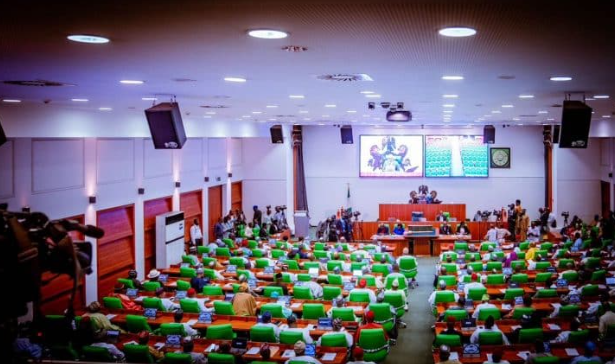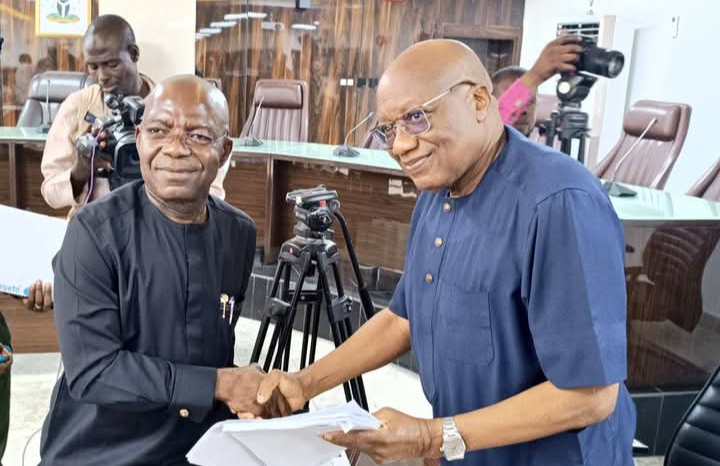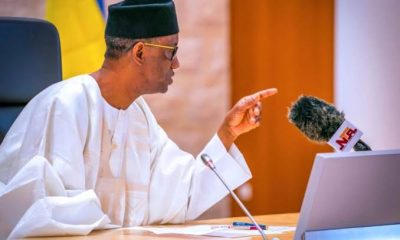News
Just in: Reps Disagree as Tinubu seeks extension of 2023 Appropriation Act, Supplementary Budget

By Kayode Sanni-Arewa
The House of Representatives on Thursday was divided over President Bola Ahmed Tinubu‘s proposal to prolong the deadline for the capital aspect of the ₦21.83 trillion 2023 budget and the ₦2.17 trillion 2023 supplementary budget until December 2024.
The President’s request was presented to the lawmakers today after Speaker Abbas Tajudeen reviewed the document, followed by the introduction of the executive bills seeking the extension.
However, when the Leader of the House, Prof Julius Ihonvbere, called for a second reading of the bills, the House Minority Leader, Kingsley Chinda, expressed reservations about the extension of the two budgets.
Chinda, opposing the extension, argued that it would be ethically questionable for the country to operate on three to four budgets simultaneously.
He pointed out that the budget for 2024 is in progress, and the executive is simultaneously seeking extensions for the 2023 main budget and supplementary budget.
He suggested that instead of extending the deadlines, the critical projects in the supplementary budget should be transferred to the main budget.
Former House Leader, Alhassan Ado Doguwa, also backed the Minority Leader’s stance, stating that having three budgets operational at the same time would be morally unacceptable.
Speaker Abbas Tajudeen, during his intervention, urged the members to vote in favour of extending the budget implementation, citing that the majority of the items in the supplementary budget were related to security.
However, despite his pleas, the majority of the lawmakers appeared not comfortable with the request for an extension of the budgets as they kept on shouting “No!”No!”
After the development, the House Speaker requested that the House enter an executive session for members to resolve problems prior to continuing the review of the legislation.
The House is presently in an executive session.
News
SAD! APC lawmaker dies while asleep

The lawmaker representing Kaura Namoda South Constituency in the Zamfara State House of Assembly, Aminu Ibrahim Kasuwar-Daji, has died.
It was gathered that the lawmaker passed on in his sleep during the early hours of Wednesday.
Aminu Ibrahim Kasuwar-Daji’s sudden death came as a shock to many in the state, especially his colleagues and political associates.
The All Progressives Congress (APC) in Zamfara, the party under which he was elected, expressed deep sorrow over his passage.
Members of the party, including the State Working Committee and other supporters, described his death as a great loss.
They said he was known for his dedication and honesty in serving his people.
His family, community members in Kaura Namoda South, and fellow lawmakers have been thrown into mourning as preparations for his burial began.
According to Islamic rites, he was buried today at 3:00 pm in his hometown of Kasuwar-Daji, located in the Kaura Namoda Local Government Area.
Many in the state have continued to express grief as they remember the role he played in representing the people and contributing to the work of the state assembly.
News
Just in: Sam Olumekun takes over as INEC’s Acting Chairman

Mr. Sam Olumekun has taken over at the Independent National Electoral Commission (INEC) as Acting Chairman.
Olumekun is INEC’s National Commissioner in charge of Information and Voter Education.
He performed his first duties today, receiving a high-level delegation of the Labour Party (LP) at the Commission’s headquarters in Abuja with other National Commissioners in attendance.
The delegation was led by Abia State Governor Dr. Alex Otti, who visited the Commission to discuss key developments within the Labour Party.
It was gathered that both parties engaged in discussions centered on enhancing collaboration and reinforcing democratic values.
During the visit, Governor Otti formally presented a Certified True Copy of the recent Supreme Court judgment concerning the party’s leadership.
He noted that the meeting was aimed at fostering clarity, mutual understanding, and institutional alignment regarding the Labour Party’s current structure.
Mr. Olumekun, the Acting INEC Chairman, reaffirmed the Commission’s unwavering commitment to neutrality, transparency, and the rule of law in the discharge of its constitutional responsibilities.
Recall that a viral WhatsApp message had indicated that Prof. Mahmood was sacked by President Bola Tinubu and replaced with one Prof. Bashiru Olamilekan.
“INEC Chairman Prof. Mahmud Yakubu has been replaced with Prof. Bashiru Olamilekan by President Tinubu,” the message, which had no attribution, read. However, both INEC and the Presidency debunked the widespread report.
Yakubu, who is rounding off his second tenure in office, is expected to exit the system towards the end of this year.
The process of appointing an INEC chairman is the President nominating a candidate and forwarding his particulars to the Department of State Services (DSS) for profiling.
After such screening, the President, thereafter, takes the name to the National Council of State for its advisory review.
Based on the outcome, the President sends the name to the Senate for screening and confirmation.
News
Crude oil prices slide further, now selling below $57

Crude oil prices have dropped below $57, following a previous rate of $59.78.
This decline coincides with the imposition of tariffs on several countries by US President Donald Trump.
A report from West Texas Intermediate attributes this price slump to consistent 6% reductions observed last week.
JPMorgan Chase & Co has warned that these tariffs could likely push both the US and global economies into a recession this year.
The financial institution explained that the tariffs, set to take effect this week, are expected to have widespread economic repercussions.
Market analysts and the business community have expressed concerns about the negative implications of these measures, predicting a slowdown in economic activities and a subsequent decline in oil demand.
-

 News11 hours ago
News11 hours agoBanditry:” I was chained for 32days while in their den, killed my wife as I watch-Nat’l Assembly DD narrates experience
-

 News6 hours ago
News6 hours agoPolice Inspector Slumps, Dies While Celebrating After Arsenal Wallop Real Madrid 3-0
-

 News12 hours ago
News12 hours agoUS revokes more than 500 foreign student visas
-

 News18 hours ago
News18 hours agoBandits have seized control of 64 communities in Plateau – Gov Muftwang
-

 News13 hours ago
News13 hours agoIbas picks administrators for 23 Rivers LGs(SEE list)
-

 Economy18 hours ago
Economy18 hours agoMobile Money transactions hit $1.68trn in one year
-

 News19 hours ago
News19 hours agoRibadu warns against ransom payment to terrorists, kidnappers, others
-

 News5 hours ago
News5 hours agoSAD! APC lawmaker dies while asleep





